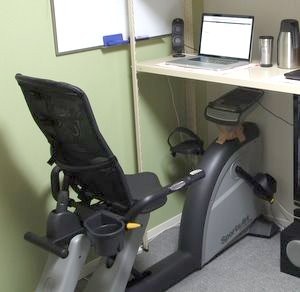Many office workers who sit at a desk all day are living a sedentary lifestyle. Since it is hard to find time to burn calories and fat through a gym workout they are at a higher risk of obesity, diabetes, heart disease, and some kinds of cancer. However, researchers have discovered that putting a portable pedaling device underneath office desks encouraged office workers to use the equipment, causing results such as weight loss and improved health, better concentration, and more productivity.
Researchers from the University of Iowa conducted the study. Their findings were published this month in the American Journal of Preventive Medicine.
The study had two goals. They included observing the effects of the office workout, and determining how many subjects would exercise more than the recommended 30 minutes, according to Capital Berg.
Findings revealed that the desk pedals were an effective method for exercise. Workers chose to use the gadgets. This allowed them to get more physical activity while they answered phones, read e-mails, and typed reports.
The more the volunteers used the pedaling devices, the healthier they became. This resulted in various improvements in physical and mental health, which reduced sick days taken.
Today's employees rarely use their companies' fitness facilities. They usually cannot spare 30 or 60 minutes for a workout, and bringing a set of workout clothes to the office can be a hassle.
Lucas J. Carr is an assistant professor at the University of Iowa. He was also the study's co-author.
Carr's team gave 27 overweight and obese office workers a pedaling device for 16 weeks, according to The Market Business. They were put under the volunteers' desks and a monitor tracked how much time the workers spent pedaling.
Most of the subjects spent 50 minutes exercising daily. That was almost two times the recommended half an hour of exercise per day.
Previous studies have observed the physical activity of employees after workout machines such as treadmills were installed in shared office space. However, such devices were rarely used. This was likely due to the lack of privacy, and scheduling conflicts.



























